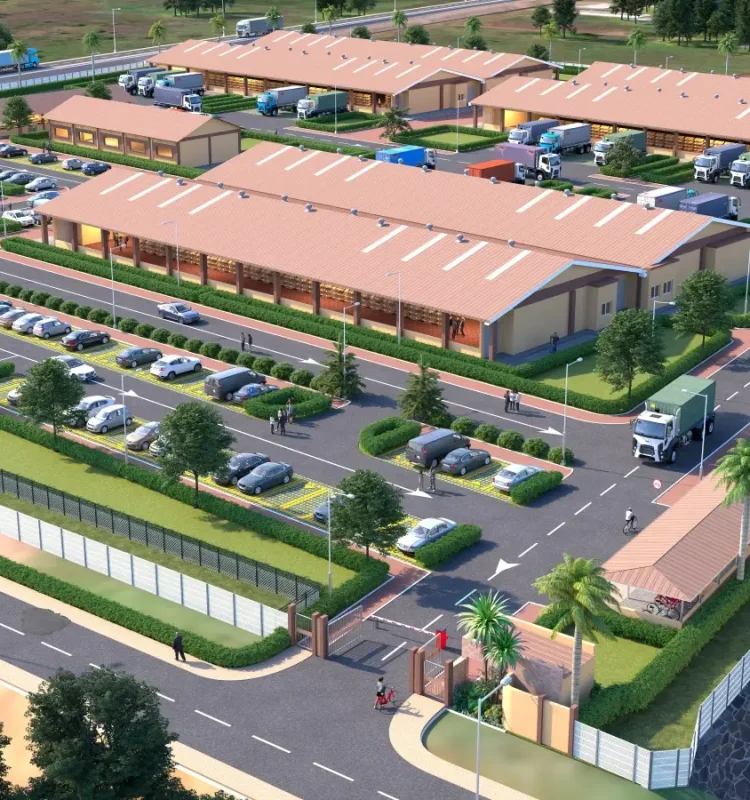Project Brief
Elegu Cross Border Market, Uganda

Implementation Partners
TradeMark Africa (TMA)

Implementation Period
2025 - 2027

Project Participants
Government of Uganda, Amuru District Local Gov ernment, Elegu market traders

Funding Partner
Royal Danish Embassy Kampala (DANIDA), and the European Union delegation in Uganda (EU) under the Team Europe collaboration
Value (In EUR €) = 9.9 million

Project Rationale
Elegu, Uganda’s key crossing into South Sudan, has become one of the country’s leading exit points for informal exports, with trade growing from USD 50.38 million3 in 2018 to USD 111.3 million in 2022. In 2022 alone, 1.35 million metric tons of goods valued at USD 220 million passed through Elegu, driven by agricultural produce, livestock, and manufactured goods. Informal exports to South Sudan more than doubled over five years, making it Uganda’s third-largest informal trade partner, highlighting the strategic importance and resilience of the Elegu–Nimule trade corridor.
However, the area is hit by floods during the two rainy seasons each year, delaying the movement of goods, including humanitarian cargo, sweeping away stalls and submerging goods in the market, thereby causing immeasurable losses to small scale cross border traders, as reported in this Global Report Journal. The current market infrastructure is poorly equipped to cope with such extreme weather events, and traders have repeatedly protested over inadequate sanitation and water facilities, which have led to disease outbreaks. Standards of traded produce is compromised in the market which also has no waste management system.
Women constitute 63% of informal traders at the Elegu border market, engaging in the trade of agricultural products, meats, vegetables, and other goods. The project aims to address the unique challenges faced by women, including childcare responsibilities, lack of proper market infrastructure, and vulnerability to climate related disruptions. 40% of Persons with disabilities in Elegu also struggle because infrastructure is not accessible which prevents them from fully engaging in trade activities.
The Elegu Climate Resilient Cross-Border Market Project is designed to address the critical challenges posed by climate change, while empowering vulnerable groups, particularly women, youth and people with disabilities (PWDs), in the informal Cross-Border trade sector. The first of its kind for Uganda, this climate-resilient market at Elegu represents a transformative initiative aimed at enhancing trade, fostering economic growth, and promoting gender and climate resilience in Uganda. These changes support household incomes, attract investment in services, and reinforce Uganda’s regional trade routes and corridors.
Implementation Strategy
- Flood mitigation: Raising the entire site (11.45 acres) by 2-2.5m to above the flood level (top of Gulu-Nimule Road ground and integrating reinforced drainage channels, to ensure that seasonal flooding of the Unyama River cannot disrupt trading. During the rainy season, rainwater retention swales, permeable paving beneath parking areas, and stormwater settling basins will capture and safely divert runoff, keeping the market dry, operational, and resilient year after year.
- Establishment of market infrastructure: Market shades for 1,500 vendors, a restaurant, day care, banking hall and essential facilities such as toilet blocks and a gatehouse.
- Climate resilience & green energy: Cyclone ventilation, open sided structures for air circulation, roof insulation, installation of solar panels, and fire protection systems, water supply and rainwater harvesting systems, a borehole for alternative water supply) and improved waste management.
- Establishment of a grain handling facility: To improve post-harvest handling, storage, and quality control of grain, reducing losses and enhancing market competitiveness for smallholder farmers and traders.
- Construction of a 450-meter access road (slip lane): Linking the Elegu market to the Gulu-Atiak-Nimule Road. Combined with covered loading bays and clearly marked parking for fifty vehicles, will halve the time vendors spend on unloading and loading goods. Internally, separate inbound and outbound lanes with raised pedestrian crossings will streamline movement, reduce congestion, and minimize post-harvest losses, translating directly into higher daily turnover for traders.
- Gender analysis study and capacity building of the Elegu Trade Associations: A Market Management Committee composed of traders’ representatives and local government officials, will be established. This committee will oversee operations, set and enforce market rules, and manage upkeep. Additionally, vendors will receive hands-on training in financial record-keeping, hygiene standards, and conflict resolution, fostering a culture of transparency, accountability, and shared responsibility that will sustain the market’s success over the long term.

